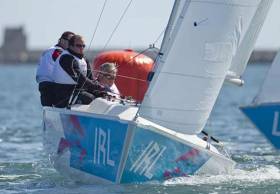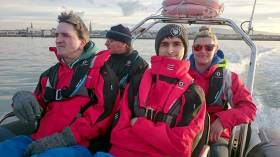Displaying items by tag: Spinal Injuries Ireland
Spinal Injuries Ireland and Dun Laoghaire Marina on Dublin Bay have announced the installation of a new Oxford Dipper Hoist to allow wheelchair users to easily access boats.
Wheelchair user, Jenny Needham, is the Administration Manager at the Marina and she welcomes the hoist as “it is bringing accessibility to the harbour”. The marina also has a fully accessible self-contained lavatory and shower which is immediately accessible from the forecourt.
Paal Janson, General Manager of Dun Laoghaire Marina says “promoting and facilitating accessible boating has long been an important cause for Dun Laoghaire Marina. Disability shouldn’t be a barrier to getting out on the water and we are keen to facilitate that ambition. We are pleased to work with Spinal Injuries Ireland to make access for all a reality.”
Spinal Injuries Ireland have a RIB, Niamh, berthed in the marina and this is a popular element of their Let’s Go Activity Programme. People who have suffered a spinal cord injury can take a trip up the Liffey with family or friends and maybe a spin around Dalkey Island, weather and tide permitting, before enjoying tasty fish and chips from the East Pier. This type of experience can show someone who has experienced such a life-changing injury that there is fun to be had and give them confidence to take on new challenges and set new goals.
Fiona Bolger, CEO of SII, states “SII’s powerboat trips in Dublin Bay are one of our most popular activities. Often the trip in Dublin Bay is the first time a newly injured person and their family go on an excursion together and the feedback is very positive. We could not provide this service if it was not for Dun Laoghaire Marina, MGM Boats and our team of loyal volunteers.’
The purchase of the new hoist was partly funded by HSE National Lottery Grant, a Community Activity Grant from Dun Laoghaire Rathdown County Council and funding from Dun Laoghaire Marina.
Spinal Injuries Ireland would also like to thank Paal Janson and the team at Dun Laoghaire Marina for supporting the programme and Gerry Salmon of MGM Boats for his generous sponsorship of the fuel.
Sailing Paralympian Hosts Black Tie Ball in Aid of Spinal Injuries Ireland
John Twomey, Ireland’s most decorated Paralympian athlete, to host exclusive black-tie ball in Cork in aid of Spinal Injuries Ireland.
The Cork Jazz Ball in aid of Spinal Injuries Ireland is set to take place at the Clayton Silver Springs Hotel in Cork on Saturday 28th October 2017.
The event will be a black-tie affair and will feature a prosecco reception, a four-course meal with wine, prizes, music and dancing until the early hours.
Well-known jazz group, The Swing Cats, will also appear on the night and play music from their fantastic repertoire of songs.
John Twomey, organiser of the event along with a committee of volunteers, is Ireland’s most decorated Paralympian athlete and has competed in a total of 11 Paralympic Games since 1984.
He was also the official flag bearer for Ireland at last year’s Paralympic Games in Rio de Janeiro.
John is an avid sailor and is a member of the Kinsale Yacht Club where he completes all his training for the Paralympics Games.
John explained that he decided to organise this upcoming ball in aid of Spinal Injuries Ireland (SII) as he saw first-hand the important work SII carry out in his local community.
Currently, Spinal Injuries Ireland provides support to 214 people and their families in Cork and over 1,800 people nationwide. SII provides a range of services to people living with spinal cord injuries (SCIs) including its Community Connect service whereby a Community Outreach Officer visits clients in their homes to offer active support and goal setting along with providing up to date information on applying for grants.”
He also explained that SII provides a Peer Mentoring service which links volunteer peer support mentors with people living with spinal cord injuries in their local area.
“This is an amazing service as it links people with new spinal cord injuries with people who are further along in their injury to advise them and provide an additional support network that they can access at any time.”
Lastly, SII provides a Family Support service which provides support to family members directly. This is a separate service that SII provide in addition to offering support to the person with a spinal cord injury.
John said that he is excited about the upcoming ball in aid Spinal Injuries Ireland and added: “The proceeds from this ball will provide much-needed funding to Spinal Injuries Ireland so that they can continue to provide essential services for people living with spinal cord injuries in Cork.
“It is so important that people living with SCIs continue to have access to the services that Spinal Injuries Ireland provide within the community. It is vital for people living with disabilities in Cork that these services not only continue but expand on a much larger level.”
All money raised on the night will go towards helping SII deliver increased services to clients and families living with spinal cord injuries in Co. Cork.
The price for a table of 10 people at the Cork Jazz Ball in aid of SII is €900 per table or €90 per person.
Spinal Injuries Ireland Seeks Support For Charity Work; Including RIB Trips on Dublin Bay
As part of its annual fundraising campaign, Spinal Injuries Ireland is seeking support from the sailing and boating community on its 'Colour me Friday' campaign day today.
Spinal Injuries Ireland is the only support service for people who have sustained a spinal injury and it provides a pathway of services for patients and their families from onset of injury to inclusion in their local community.
One of these successful pathways is SPII's 'Active Me' programme, an actvity that brings patients out on the SPII RIB on Dublin Bay.
SII relies on fundraising for 61% of its income. To contribute towards the campaign text CORD to 50300 to donate €4 to SII.

Spinal Injuries Ireland Needs Your Help On The Water This Summer
#Help - Spinal Injuries Ireland takes patients from the National Rehabilitation Hospital on Rochestown Avenue out on their RIB in Dun Laoghaire and fishing and kayaking on their Pioneer Multi in Blessington.
For summer 2014, the charity needs your assistance so it can continue to offer its free on-the-water programme to patients who are traumatised having sustained a recent spinal cord injury.
If you're in Dun Laoghaire, can you give some of your time? Spinal Injuries Ireland is looking for volunteers to assist the Cox on Monday afternoons and Wednesday evenings during the summer months. Full training will be provided.
If you're in Blessington, do you have a second-hand engine you could give, or can you donate towards a new engine? The Pioneer Multi has a drop-down stern which allows for wheeling wheelchairs on to the boat, which is used for both fishing and kayaking, but its outboard 40hp long-shaft electrical start engine needs to be replaced, at a cost of at least €3,000 for a second-hand engine, or €7,000 or a new one.
If you can help with either request please contact Jen ay 01 235 5317 or email [email protected].
The water activities that Spinal Injuries Ireland offers are only one element of its support and services to people who have sustained a recent spinal cord injury. These trips offer a welcome relief for patients who are undergoing intensive therapy programmes in the NRH.
The freedom of getting out on the water has a profound positive impact for patients, many of whom will never walk again.


























































